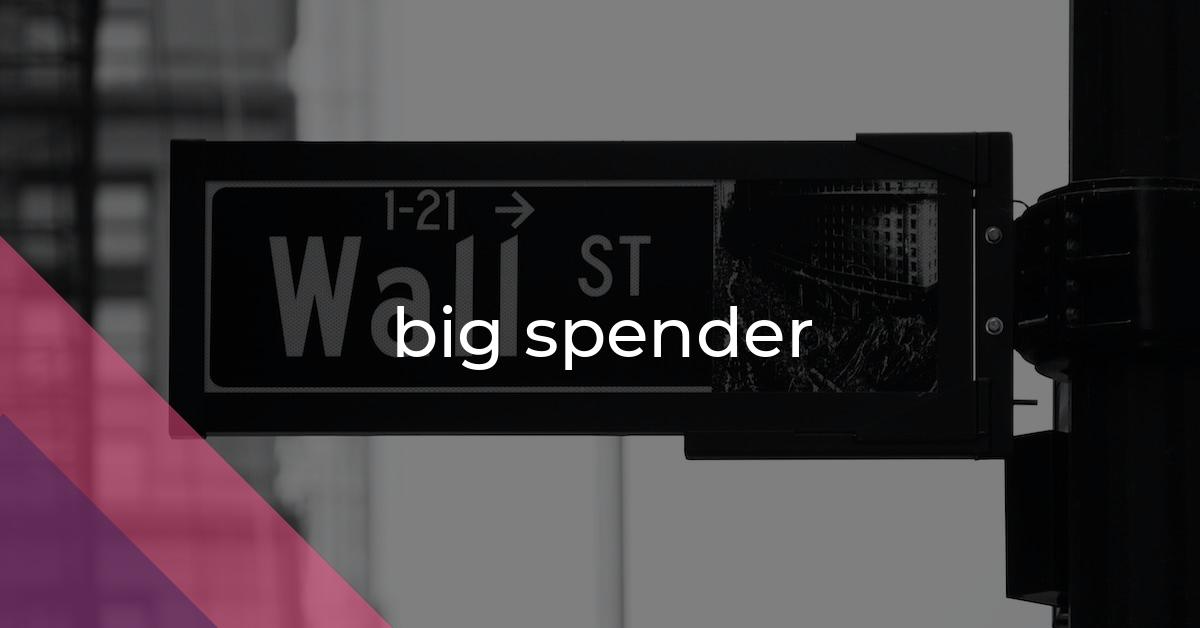big spender: Idiom Meaning and Origin
What does ‘big spender’ mean?
The idiom big spender refers to someone who spends a lot of money without hesitation or restraint.

Idiom Explorer
The idiom "throw money away" means to spend money on something that is essentially wasteful or unnecessary, resulting in a loss of money or resources.
This phrase suggests a careless or frivolous attitude towards money, implying that the person is not concerned about the value or usefulness of what they are spending their money on.
The idiom "dollar-sign eyes" refers to someone who is extremely greedy or obsessed with money, often to the point of disregarding ethical or moral considerations.
The idiom *deep pockets* refers to someone who has substantial financial resources or is able to spend a lot of money. It suggests that the person is wealthy and able to make significant financial commitments or contributions.
The idiom "common purse" refers to a situation where a group of people pool their resources or funds together for a common purpose or goal.
The idiom "chump-change" refers to a small or insignificant amount of money or anything of little value. It implies that the amount mentioned is not worth much and is easily dismissed or disregarded.
The idiom "champagne taste on a beer budget" means having expensive or luxurious preferences but lacking the financial means to afford them.
The idiom "cashed up" means to have a lot of money or to be financially well-off.
Break the bank means to spend a lot of money or to cause financial hardship by spending excessively.
Extravagant Revelations
The idiom "big spender" is widely used in the English language to describe individuals who spend money extravagantly or without hesitation. It originated in the early 20th century, with "big" emphasizing the magnitude of spending and "spender" indicating the action of expending money.
In popular culture, the idiom has become a part of everyday language, appearing in movies, books, and song lyrics. It is often used to describe celebrities and individuals in the entertainment industry who are known for their exorbitant spending habits.
However, the meaning of "big spender" has evolved beyond its literal interpretation. It can also be used metaphorically to describe a person who is generous or willing to invest a significant amount of time, effort, or resources into a particular endeavor.
In a broader socio-cultural context, the idiom reflects society's fascination with wealth and opulence. It taps into the human desire for affluence and a luxurious lifestyle, eliciting both admiration and envy from others.
But the idiom also raises questions about values and priorities. Does excessive spending and indulgence truly equate to success and happiness? Or does it serve as a cautionary tale, warning of the potential pitfalls of unchecked consumerism?
While "big spender" primarily conveys notions of excessive spending and lavishness, it also expands its meaning to encompass generosity and abundance. As society continues to grapple with wealth, materialism, and fulfillment, the idiom persists as both a reflection of our desires and a reminder of the complexities that come with a life of excess.
The idioms "big bucks," "deep pockets," and "throw money away" are closely related to the idiom "big spender." Each of these idioms conveys a similar theme of spending money in a significant or extravagant manner.
"Big bucks" is a colloquial phrase that refers to a large amount of money. It suggests that someone is willing to spend a considerable sum of money, similar to a "big spender." Both idioms connote a sense of wealth and financial resourcefulness.
"Deep pockets" is another related idiom that implies someone has a lot of money to spend. It suggests that someone has the financial means to make lavish purchases without hesitation, much like a "big spender." The idiom conveys a sense of affluence and financial stability.
"Throw money away" is an idiom that implies wasteful spending without regard for the value of the purchases. It aligns with the idea of a "big spender" who spends money extravagantly, regardless of the consequences. Both idioms suggest a lack of financial responsibility and a willingness to spend without considering the long-term effects.
The idiom "big spender" is used to describe individuals who spend money extravagantly or without hesitation. It has gained prominence in popular culture and reflects society's fascination with wealth and the allure of a luxurious lifestyle. While the idiom primarily conveys notions of excessive spending and lavishness, it also expands its meaning to encompass generosity and abundance. The idioms "big bucks," "deep pockets," and "throw money away" are closely related to the idiom "big spender" as they all convey a similar theme of spending money in a significant or extravagant manner.
Example usage
Examples of how the idiom big spender can be used in a sentence:
- She is known as a big spender, always treating herself and others to the finest things money can buy.
- After winning the lottery, John became a big spender, splurging on luxurious vacations and expensive cars.
- Despite his modest income, Tom likes to portray himself as a big spender by constantly eating out at fancy restaurants.
More "Finance" idioms



